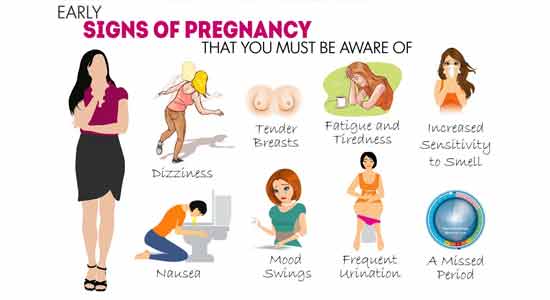
Not Sure If You Are Pregnant? Look For These 9 Subtle Signs
Of course, the only way to know you’re pregnant for sure is by taking a pregnancy test. But there are many early indicators that point to pregnancy as their likely cause. It’s important for women to be aware of these symptoms, so they don’t make the mistake of attributing them to something else and to know when they should consider getting a pregnancy test.
Bear in mind, that every woman experiences pregnancy differently. Some claim to have never experienced early symptoms of pregnancy. The symptoms can even vary for the same woman from one pregnancy to the next.

1. Implantation Bleeding
After the egg is fertilized, it embeds itself in the uterus wall in a process called implantation. Implantation usually causes spotting and cramping within six to twelve days of fertilization. Many women mistake these symptoms for early signs of menstruation, though the bleeding is very light.
It is also common for pregnant women to have a milky white discharge from their vagina. This is caused by the thickening of the walls of the vagina, a process that begins almost immediately after conception.
RELATED: 10 Tips for a Safe Pregnancy After a Miscarriage
2. Changes in Breast Size and Sensation
Breast tenderness tends to occur within about four weeks of pregnancy. This happens because of hormonal changes in the body that begin immediately after conception. Breasts can become swollen, tingly, sore, heavy or tender. Areola, the area around the nipples can also become darker. The good thing is that it doesn’t take much time for the body to get used to these hormonal changes. Once it does, the breast changes are no longer uncomfortable.
RELATED: If Meghan Markle Was Pregnant In Pakistan
3. Nausea and Altered Appetite
Morning sickness is perhaps the most famous early pregnancy symptom. Nausea (which is also thought to be a consequence of changing hormones) can occur at any time of day, but most commonly occurs in the morning.
Pregnant women also experience cravings, altered appetite and food aversions. These are also a consequence of hormonal changes.
Luckily, these symptoms tend to be characteristic of early pregnancy and lessen (without going away completely) after 12 weeks or so.
4. Missed Periods
One of the main reasons why tracking your menstrual cycle is so important is that you can tell immediately when something has changed. 30 percent of women discover that they are pregnant through missed periods.
5. Fatigue
A woman can begin feeling unusually exhausted within just one week of conception. This happens because of the hormone progesterone, which can make you feel sleepy.
6. Increased Urination
Pregnant women begin to urinate more frequently after 6 weeks of pregnancy. However, increased urination can have several other causes such as urinary tract infections and diabetes.
7. Mood Swings
The hormonal changes that occur during this period can have a significant impact on mood. Mood swings occur most often in the first trimester. Common feelings include depression, anxiety, euphoria and irritability.
8. Aches and Pains
Many women experience back pain and headaches early on in their pregnancy as well as dizziness and fainting. If the dizziness and fainting are results of abnormal blood pressure during this time, it is important to contact your physician right away.
9. Constipation and Bloating
Pregnancy hormones cause the digestive tract to slow down, resulting in constipation and abdominal bloating. These symptoms are exacerbated later on with the added pressure of the fetus on the abdomen.
So, if you are experiencing any of these symptoms, do a pregnancy test. In case you are pregnant, here are the tips to stay healthy during pregnancy.

